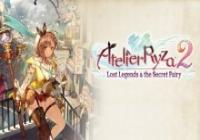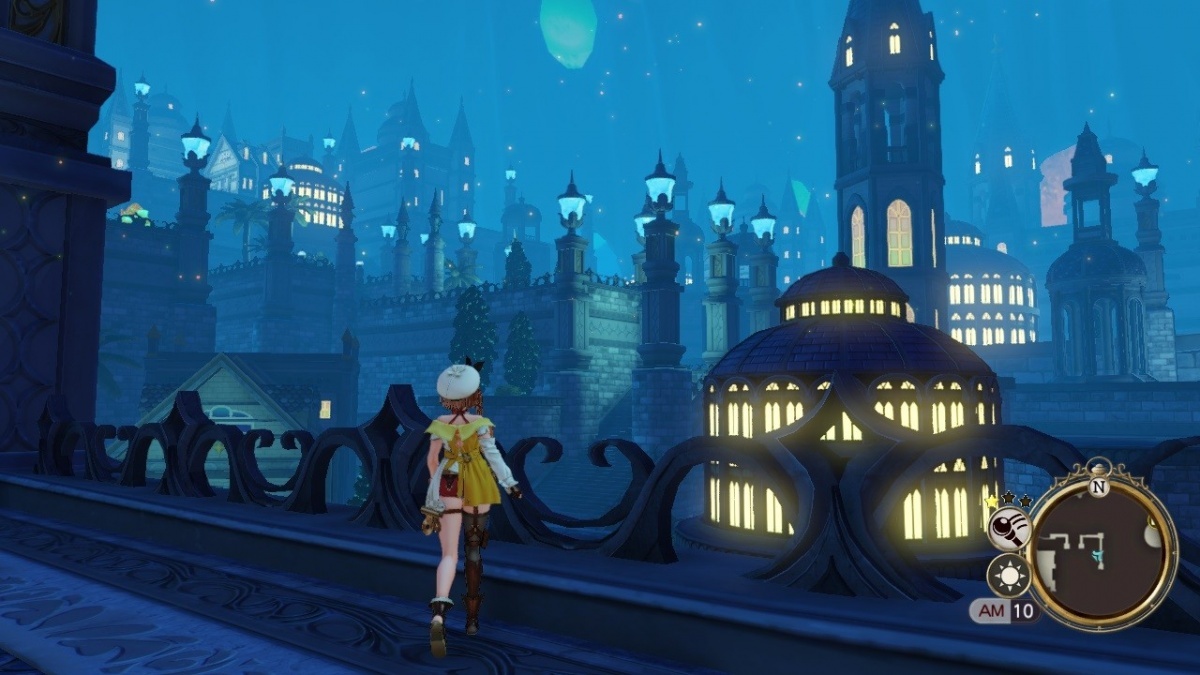Atelier Ryza 2: Lost Legends & the Secret Fairy (PlayStation 4) Review
By Eric Ace  27.01.2021
27.01.2021

The first game in the series rode on an absolutely huge wave of hype, that to be blunt, was based entirely on the sex appeal of the main character. It was odd for the generally milquetoast series to be so blatantly sexualized, but the results were clear: it was a large success. The problem was that the game somewhat failed to live up to its crazy hype. While completely playable, it was not mind blowing in any significant way. The sequel by and large falls into the same trap of having an 'okay' game that never really goes anywhere.
The Atelier games have had a very long and varied history. Back on the PS2, the Atelier series played much more like conventional JRPGs at the time. Included in this was the tremendously popular Mana Khemia off-shoot that was more combat orientated. The series went back to a far more 'slice of life' and slow-paced feeling for the PS3 in the Arland series. Next up was the Dusk series (reviewed earlier this year to generally good praise), which had a tighter narrative, tighter gameplay and a great battle system. Eventually came the Ryza series, which largely played as a slice-of-life game like some of the others in the series.
Atelier Ryza 2 plays very similar to the first game, and largely your enjoyment is going to be in direct proportion to the reaction the first game may have given. There are some worse things, and some better things which will be talked about in a minute. The biggest issue to keep in mind is the general lack of coherency to the overall game. There are some parts that are great, some that feel tacked on, and overall its works but just barely. It feels like they threw everything they had and hoped something sticks, instead of a focused experience.
One of the most notable things off the bat was the out-right sexualized appearance of Ryza actually seems toned down ever so slightly, even if it is present elsewhere. Oddly, everyone is older in this game but Ryza looks the exact same - if anything, her assets seem reduced oddly. One can't help but think they might have given into complaints about its sexualized main character. It got to them and they didn't take the logical conclusion of having her expand further as she got older. Yet they knew what helped propel their sales (sex) and couldn't truly back off of it. Personally, beyond Ryza's physical aspects, her personality is pretty boring and stereotypical. Escha was a far better waifu from the Dusk series due to depth to her character, contrasted with Ryza just being a naïve tomboy with huge sex characteristics.

The first game routinely had scenes with female characters talking to each other in close proximity, each equipped with huge balloons on their chest almost acting as bumpers from letting them get too close to each other. In this game, characters fall squarely into two camps: flat or stacked, but regardless of their upper construction, every character has huge thighs and legs, so even the loli character looks like she has been making sure to not miss leg day. Now to be clear here, this reviewer has no problem with sexualized characters, but in an 'innocent' game like this it feels a little weird; and as mentioned, it looks like Ryza herself was reduced which some players certainly won't be happy about. Plus it was a huge aspect to the games sales and needed to be talked about. It would actually perhaps be preferential if Ryza actually was aware of her assets and flirted with characters rather than the naïve shtick which feels immersion destroying.
Gameplay cycles between three main sequences: exploring, story, and alchemy. One of the biggest improvements over the first game is the exploration. The new levels look great. While not personally a fan of the huge city, clear detail went into it. The outer levels are by far the high point of the show. Whether it is running through the grassy or flower fields, looking at the waterfalls, or going through canyons, it is a huge compliment to how nice these areas are. The height of the experience was questing towards the second ruins and going further and further out to these increasingly hostile and darker environs with huge cliffs, dead bones and trees littering the way.
This compliment brings up a problem present and mentioned earlier: inconsistent direction. This exploration phase is at one part absolutely great and others, not much at all. The ruins look very typical, and it's simply just run from point A to B. Many of the areas also just feel bloated. There is a ton of space, a ton of enemies, and a ton of gathering points, and the player doesn't even need half of them. One thing the Atelier Dusk series did that was well done was that the dungeons, if overly simplistic, provided a very narrow gameplay focus: fight the couple of enemies, gather the couple spots, and move on. Here, one single screen can easily have 40 or more enemies scattered over the map, and easily a hundred or more gathering spots. Especially when a gathering spot can give upwards of 5 items, it becomes overwhelming very quickly because everything is so similar nothing matters.

The story has strong points, but far more often it is a weakness. The 'deeper' plot about exploring the ancient ruins, dealing with beasts of light and darkness, and so on is great. There is a very cool aspect to the ruins where the player finds memory fragments of old explorers and to piece together the plot through this. Far more often are trivial slice-of-life story segments of running into someone, some simple trouble, or pointless misunderstanding. In the first game many players complained about just skipping scenes for how banal they were, and this game played at length would easily fall into that. The game is subbed, which feels like a cheap way out because the Dusk series had a really good dubbing. Subs can be forgiven if done right, but it is not an exaggeration to say about 50% of the stuff is not subtitled, such as when she is talking in combat, or doing alchemy or seeing new environments.
Battle is somewhat similar to the first game, but worse. It is based on a real-time system of everyone waiting to charge up their turn before they move. Each character does a 3-hit combo that generates a type of point that can then be used for special moves. The largest complaint is the only way to use items is the battle has to wear on long enough before the 'item points' are charged, which the player can then use the items limitlessly assuming they have item points remaining. One of the great things the previous games did was allow you to use 'clones' of any item you made. It allowed great items to be made without the fear of just using it up once. Now, ironically the items lose some of their value because ANY healing item is good enough since it can just be used over and over. The worst part is the status bar for who's turn is coming up went from a large, clear bar in the first game, to this small, unusable thing in the corner that feels like an afterthought just thrown in.
Alchemy follows the same system of the first (though the tutorial is absolutely horrendous about explaining any of the finer points). Essentially every item has its own mini 'sphere grid' of say, 8 slots to shove ingredients into. Often only 2-3 will be open at the start, and depending on the quality, type and number of ingredients slotted into each sphere, it will open different directions to then add more things. Ultimately, this can be changing the quality of the item, or give it different traits such as doing more damage, or different elements.

The system is a bit too much, and this is coming from someone that has played many of the games in the series. As pointed out earlier, when adventuring in the woods, players routinely find hundreds of ingredients. Hundreds. Now when back at base, the player has to pick a log or something to slot into the sphere, well now there are 50 or more of the SAME log, different qualities, and different traits and so on. It becomes overwhelming if someone wants to do it perfectly, so far more often it simply becomes 'good enough' to throw the first thing in there and deal with the consequences at the end. The problem is this then cascades that if the player isn't truly bothering to select all of them, why have so many? It'd be far more compelling to only have say 5 logs that are different and pick one of them to use.
Overall the game is fine, but it never really reaches any great heights. Some of the coolest parts, like the dark, treacherous canyon on the way to the 2nd ruin is contrasted with stupid scenes about looking for sweets back in town. It really feels like the director or whoever was the highest in charge didn't have a singular vision, and each part of the team just threw their stuff in and they went with it. The game is fine enough, and they will likely make a third one, which is somewhat unfortunate as their older games Mana Khemia and Ar Tonelico were far more interesting and more deserving of being expanded.

Cubed3 Rating
Good
There are some truly great parts in this game. Some of the exploration parts were really well done with the backgrounds and environment. The problem with the game overall is each system is fine enough on its own, but does not tie together in a coherent fashion. The alchemy is a little too involved for every single item, the exploration gives far too many items to actually want to sort through, and the battle system has too many small nit-picks to stop it from being great. The story is weighed down by too many trivial plots and it just lacks that 'cool' aspect others of the series like Dusk or Mana Khemia had.

![]() 6/10
6/10
![]() 0
(0 Votes)
0
(0 Votes)
 Out now
Out now  Out now
Out now  Out now
Out now  Out now
Out now Comments
Comments are currently disabled

 Sign In
Sign In Game Details
Game Details Subscribe to this topic
Subscribe to this topic Features
Features






 Top
Top

